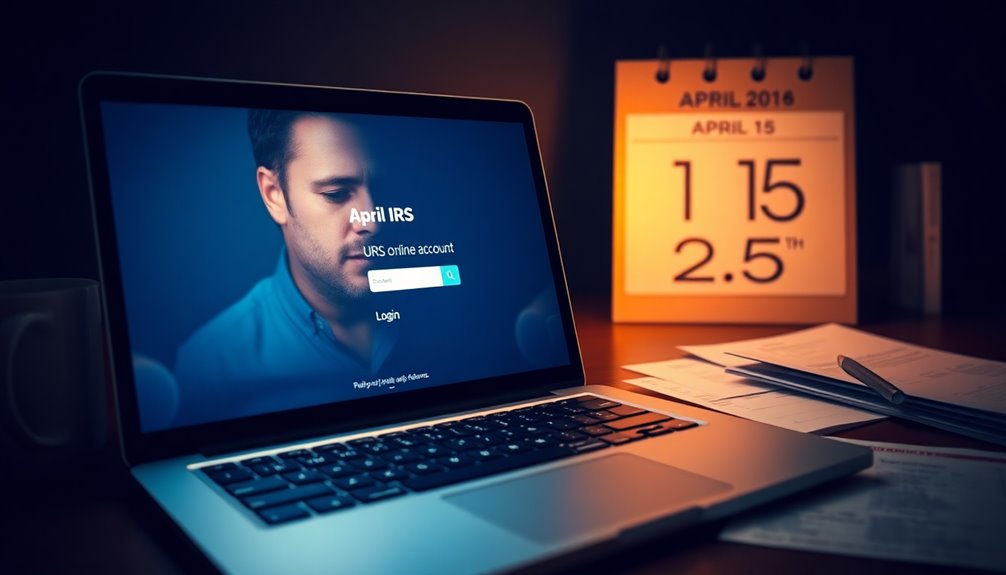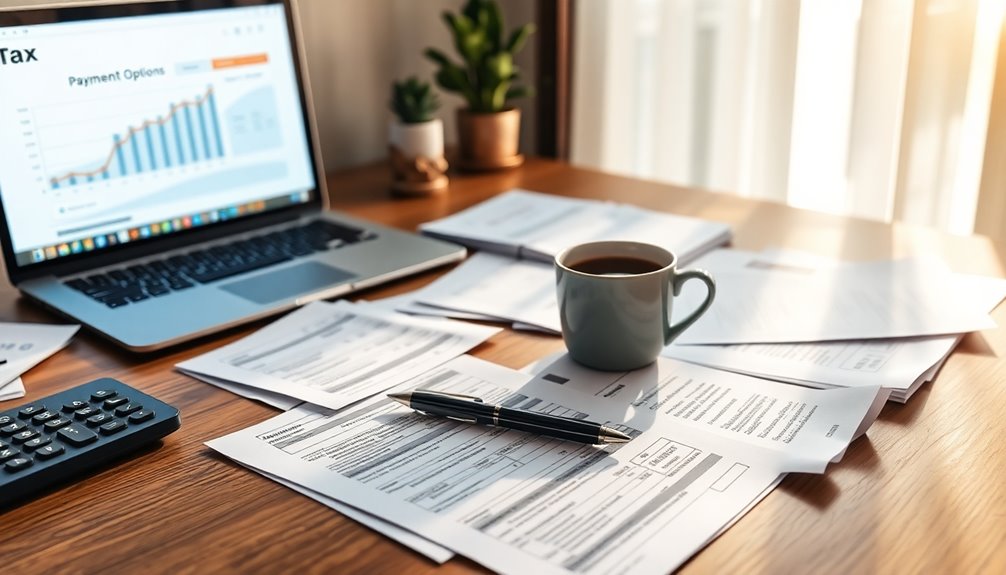To find out if you owe back taxes, start by checking any IRS notices you've received. Look for CP14 or CP501, which detail unpaid amounts. Reviewing your past tax returns is also crucial—ensure you reported all income and claimed proper deductions. Don't forget to access your IRS online account for a summary of your tax balance, payments, and any pending penalties. If you're still unsure, you can call the IRS directly for assistance or consult a tax professional to explore your situation further. Understanding these steps can provide clarity on your tax obligations.
Key Takeaways
- Check your IRS online account for outstanding balances, penalties, and payment history to determine if you owe back taxes.
- Review past tax returns for unpaid balances, unfiled returns, or discrepancies in reported income.
- Look for IRS notices such as CP14 or CP501, which indicate unpaid taxes and amounts owed.
- Contact the IRS directly at 1-800-829-1040 to inquire about your tax status and any outstanding debts.
- Maintain accurate records and documentation to track your tax obligations and ensure compliance.
Checking IRS Notices

Receiving an IRS notice can feel overwhelming, but understanding its contents is crucial for managing your tax obligations. Each type of notice serves a specific purpose and can provide vital information about your tax status.
For instance, a CP14 notice is your first reminder of unpaid taxes and outlines the amount owed, including penalties and interest. If you get a CP2000 notice, it indicates discrepancies between reported income and IRS records, prompting you to respond in writing.
The CP501 and CP502 notices serve as reminders for unpaid taxes, with CP502 being firmer and indicating accrued interest. If you receive an LT38 letter, it means the IRS is resuming collection activities, so you'll need to act quickly to avoid additional penalties. Ignoring IRS notices can lead to severe consequences, making it essential to stay informed and respond promptly.
Make sure to identify key information in these notices, like the notice number, amount owed, and due date. Understanding the reason for the notice helps clarify necessary actions, while the instructions for response guide you on how to proceed.
Always be proactive in addressing these notices to avoid further complications with the IRS.
Reviewing Past Tax Returns

After checking IRS notices, the next step is to review your past tax returns for any errors or omissions that could lead to owing back taxes.
Start by looking for common mistakes like an inaccurate filing status, unreported income, or missed credits and deductions. Also, verify if all taxes owed were paid for each year to avoid any unpaid balances. It's important to remember that interest and penalties can accumulate over time on any unpaid taxes.
Be sure to check for any unfiled or outstanding tax returns, as these can result in additional liability. If you find discrepancies or potential tax fraud, address those issues promptly. Use the correct tax forms for each year to minimize errors.
If you need copies of your past returns, obtain them from your tax preparation service or request duplicates using IRS Form 4506. A tax transcript can also provide a summary of your returns without needing the full copy.
If errors are found, calculate any additional taxes owed, including penalties and interest, and file the necessary corrections.
Consulting a tax professional can help guide you through this process effectively. Taking these steps can prevent further complications with the IRS.
Accessing Your IRS Online Account

To access your IRS online account, head over to the IRS website where you can either create a new account or log into your existing one. This account is a valuable tool for checking your tax account balance and viewing your tax records.
Once logged in, you can access detailed information about payments, penalties, and any adjustments made to your account.
Make sure all your personal and tax information is accurate and up-to-date to get the most out of your account. You can check if you owe any amounts for previous years and review your tax account balance to stay informed.
Additionally, you can view tax records and transcripts for past tax years, which will help you identify any discrepancies or errors.
If needed, you can request account transcripts to show your financial status, including payments and penalties.
Make use of wage and income transcripts to verify information from Forms W-2 and 1099.
This online account is crucial for managing your tax issues, allowing you to address discrepancies and arrange payments directly.
Contacting the IRS Directly

If you need further assistance beyond your online account, contacting the IRS directly is a reliable option. You can reach the IRS at 1-800-829-1040 for individual tax questions. The lines are open from 7 AM to 7 PM local time, Monday through Friday. When you call, select your language by pressing 1 for English or 2 for Spanish. For personal income tax inquiries, press 2.
Before calling, have your Social Security number and relevant tax documents ready, like prior-year tax returns and any IRS correspondence. Be prepared to discuss specific tax years and any notices you've received. Refund status can be checked 21 days post electronic filing.
Keep in mind that wait times can be long, but you can press 1 to enter the callback queue to avoid waiting on hold.
If your questions are about business tax returns, dial 1-800-829-4933. Alternatively, you can visit a local IRS office or Taxpayer Assistance Center for in-person help.
Consulting a Tax Professional

Consulting a tax professional can be a game-changer when it comes to navigating the complexities of back taxes. These experts conduct a comprehensive review of your past tax returns, scrutinizing every line item and supporting document to identify any errors or omissions.
They'll cross-check your returns against financial records to ensure accuracy and completeness, helping you discover potential deductions and credits that could lower your tax liability. Additionally, a tax professional will examine your financial records to accurately calculate what you owe. They'll ensure all transactions are properly reported and can identify discrepancies that may impact your tax situation. This meticulous approach helps you avoid overpaying or underpaying.
When it comes to dealing with the IRS, having a tax professional by your side is invaluable. They can represent you in communications with the IRS, negotiate payment plans, and prepare necessary documentation for penalty relief. Moreover, they can assist in evaluating your eligibility for penalty abatement, which can reduce your overall tax burden.
Understanding Collection Processes

Many taxpayers find themselves uncertain about the collection processes the IRS employs when back taxes are owed. It all begins with a Notice of Balance Due, which the IRS sends about a month after processing your return. This notice reminds you of your tax liability and warns that interest and penalties are accumulating.
If you don't pay, expect increasingly urgent letters every four weeks. If the debt remains unpaid, your account may be transferred to the Automated Collection Systems (ACS). ACS agents, akin to a call center, will attempt to contact you and may request a Collection Information Statement.
If ACS efforts fail, your case could escalate to a local revenue officer, who's broader authority to demand records and even perform site checks. This officer may also issue a Notice of Federal Tax and Intent to Levy if the debt continues to go unpaid.
Should you still not take action, the IRS can file a federal tax lien against your property, affecting all your assets. If necessary, they can enforce collection through wage garnishments, bank levies, and asset seizures.
Identifying Scams and Fraud

Tax scams are unfortunately common, and recognizing them can save you from potential financial ruin.
One prevalent scam is the refund calculation scam, where scammers claim there's an error in your tax return and promise extra refunds. They often pressure you to provide bank details urgently, usually using fake IRS emails.
Another tactic is the threat and penalty scam. Here, scammers impersonate IRS officials, threatening federal crimes or asset seizure if you don't pay immediately. They might demand payment through gift cards or untraceable methods, which should raise red flags.
You should also be wary of verification and account scams. Scammers may ask you to verify personal documents by sending photos or to create online accounts unexpectedly. They often send you emails or texts with links, urging you to click. Additionally, always be alert for unauthorized IRS accounts that may indicate your personal information has been compromised.
Lastly, unsolicited notices and forms can signal fraud. If you receive tax transcripts or notices claiming you owe money without prior communication, be cautious.
Always verify the legitimacy of any correspondence you receive, especially if it requests personal information. Trust your instincts and report suspicious activity to the IRS.
Reviewing Payment Options

When facing back taxes, exploring your payment options can provide much-needed relief. If you owe $50,000 or less, consider an Installment Agreement. You'll need to have all your required tax returns filed, and you can set up payments through automatic debit withdrawals, Direct Pay, or EFTPS. Keep in mind that timely payments are crucial to avoid defaulting. Proactive measures can significantly reduce penalties and interest, so it's essential to act quickly.
Another option is an Offer in Compromise, allowing you to settle your tax debt for less than what you owe. This may involve a lump sum or periodic payments, but you'll need to submit an application and potentially share your financial information. Remember, not everyone qualifies for this, as the IRS assesses your ability to pay.
If your financial situation is tight, you can request a temporary delay in collection. This postpones payment but doesn't eliminate the debt, and interest and penalties will continue to grow during this period.
Lastly, consider electronic payment options like IRS Direct Pay or EFTPS. These allow for online, phone, or app payments, making it easier to manage your tax obligations efficiently.
Keeping Records for Future Reference

Keeping accurate records is essential for managing your finances and ensuring compliance with tax obligations. You'll need to identify and organize key tax-related documents such as wage statements, interest reports, receipts, and property records. These records support income, deductions, and credits on your tax returns.
To store your records, consider both physical and digital methods. Use file cabinets or boxes to keep documents separated, and utilize cloud storage services like Google Drive for digital files. Organize your documents by date or category, using binder clips or accordion files to maintain order. Scanning receipts and storing them digitally can save space and make access easier. Additionally, implementing a systematic approach to record keeping can prevent the accumulation of disorganized receipts.
Remember, retention periods matter. Keep most records for at least seven years, while business tax records should be stored for four years after payment. For property records, hold onto them longer than seven years.
Finally, update your records consistently throughout the year to simplify tax preparation. Regularly back up digital files and periodically review your records to ensure accuracy, especially if you own a business. This diligence will help you stay prepared and avoid surprises when tax season arrives.
Frequently Asked Questions
How Can I Check for Tax Debts From Previous Years?
To check for tax debts from previous years, start by reviewing your past tax returns for any unreported income or errors.
You can also access the IRS Online Account to view your tax balance and payment history.
If you prefer direct assistance, call the IRS at 800-829-1040 or visit a local IRS office.
Don't forget to have necessary documents handy, like your Social Security number and prior-year tax return.
Are There Penalties for Not Paying Back Taxes on Time?
Yes, there are penalties for not paying back taxes on time.
You'll face a late payment penalty of 0.5% for each month your tax remains unpaid, which can increase to 1% if you ignore an IRS notice.
Additionally, interest will accumulate on your unpaid balance.
If you have an installment agreement, the penalty rate drops to 0.25%.
It's crucial to address any tax debts promptly to minimize penalties.
What Happens if I Ignore IRS Notices About Back Taxes?
If you ignore IRS notices about back taxes, you risk escalating consequences.
The IRS may file a tax lien against your property, affecting your credit score and borrowing ability. They can also issue bank levies, freezing your accounts or garnishing your wages.
In severe cases, ignoring these notices might lead to legal action or even criminal charges for tax evasion.
It's crucial to respond promptly to avoid these serious repercussions.
Can I Negotiate a Lower Tax Debt Amount With the IRS?
Yes, you can negotiate a lower tax debt amount with the IRS.
You might consider an Offer in Compromise (OIC) if you can prove that paying the full amount would cause financial hardship.
Alternatively, you could set up an Installment Agreement to manage payments over time.
Just make sure you're up-to-date on your tax returns and current with estimated payments to improve your chances of success in the negotiation process.
How Long Does the IRS Have to Collect Back Taxes?
The IRS has ten years to collect unpaid taxes from the date they're assessed.
This period starts the later of when you file your return or its due date. If you file late, the clock begins when the IRS processes your return.
Keep in mind that certain events, like filing for bankruptcy or applying for payment plans, can pause this collection period, extending it beyond the standard ten years.
Conclusion
In conclusion, staying informed about your tax status is crucial. By checking IRS notices, reviewing past returns, and accessing your IRS online account, you can easily determine if you owe back taxes. Don't hesitate to contact the IRS or consult a tax professional for clarity. Remember to be cautious of scams and explore your payment options. Keeping thorough records will help you avoid surprises in the future. Stay proactive, and you'll manage your taxes more effectively!









